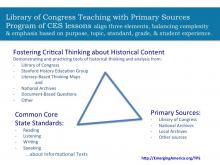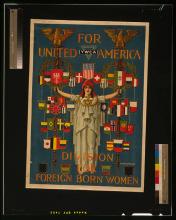Seeking Examples of DDMs CES and a team of teachers is drafting state exemplar District Determined Measures (DDMs) for Geography-7th Grade. We will also develop a packet of exemplar DDMs for U.S. and World History–and possibly other subjects. Please help us by emailing YOUR examples in any subject of the Social Studies to
rcairn@collaborative.org. (Indicate if I may share what you send.) Examples do not have to be perfect! We will learn from the variety. – Thanks!! Challenging yet practical blog post: Is it ever OK to tamper with the past? Altering primary sources to make them accessible. - Ken Wiebe History eNews now appears in the EmergingAmerica.org blog which gives a searchable archive.
LIBRARY OF CONGRESS TPS-CES - EVENTS
UMass Amherst - CES History Institute - Feinberg Lecture Series • Lecture: “The New Asylum Seekers,” Professor María Cristina García (Howard A. Newman Professor of American Studies, Cornell University), Friday, November 14, 1pm, UMass Campus Center, Room 804. Register for PDPs K-12 Teachers can earn 10 PDPs and $50 gift card for attending any two Feinberg lectures plus two sessions at CES in Northampton, January 22 and February 26 – 4:30-7:00pm. NOTE: It is still not too late to register. To make up sessions, you will be able to document that you watched videos on the UMass Amherst History Department YouTube channel. Link to them through Feinberg Lectures webpage. How to apply for NEH Institutes - Register for free session to learn how to apply for amazing, free professional development programs across the U.S. and overseas. Dec. 3 - 4:00-5:00pm at CES in Northampton. NEH, Library of Congress, and other free national professional development programs.



